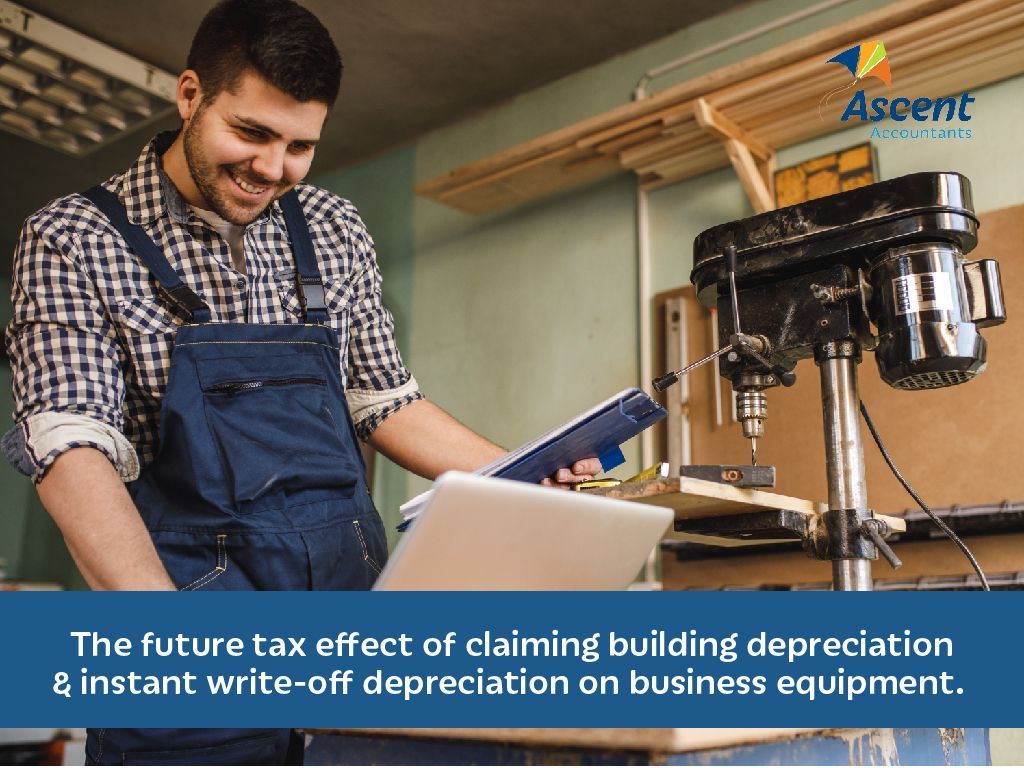The future tax effect of claiming building depreciation & instant write-off depreciation on business equipment

Like many West Australians, you might not be aware that deductions based on depreciation could come back to bite you with a heavy tax bill. This is even more true for people who are claiming depreciation on investment properties or businesses that took advantage of limited-time COVID-induced tax write-offs.
The big tax sting is a result of a lack of understanding around the rules of claiming depreciation. To make matters worse, these rules are always changing. Perhaps the potential consequences weren’t made clear, or perhaps people were so enticed by COVID-inspired depreciation arrangements that they didn’t care to research beforehand. Either way, under current tax laws, expenses incurred in generating tax-assessable income can be deducted from that income, and you pay tax on what's left.
How do tax deductions work?
There are two depreciation methods used — diminishing value and straight-line. Let’s consider the straight-line method (which is more popular): a tradie might buy a $55,000 vehicle for work purposes, which has an effective life of eight years. Under straight-line depreciation rules, the cost is divided by the life, giving the tradie a tax deduction of $6,875 a year for the next eight years. If you’re interested, the effective life for almost every asset imaginable is available on the Australian Tax Office website.
The problem, or challenge, with depreciation is that if this tradie sells the work vehicle, and the price is higher than the written down value, that extra amount becomes taxable income — a rule many aren’t aware of.
If your business used the COVID immediate write-off rules, it means the written down value is zero dollars. So, any proceeds on the sale will be assessable and form part of the business taxable income.
Property investors face similar issues when claiming depreciation and a capital allowance on their investment property. Buildings have an effective life of up to 40 years but property equipment, such as hot water systems and air-conditioning, have different lifespans.
A qualified quantity surveyor can prepare a special schedule on behalf of investors, as a basis for tax deductions. Based on these schedules, deductions of up to $20,000 are common. However, like our tradie example, there is a problem: the amount claimed reduces the cost-base used for capital gains tax calculations.
Let’s say the owner of a $500,000 investment property claims $20,000 a year building depreciation. After five years, the owner sells the property for $800,000. Sounds great, but the capital gains tax calculations will be based on a $400,000 profit, not a $300,000 profit… That's because the cost base has been reduced by five times the $20,000 (for a total of $100,000). Now, that comes off the original purchase price of $500,000.
What do we learn from this?
Deductions seem like a good idea on the surface — and they certainly can be in the right circumstances — but they can end up costing you. Remember, just because you’re getting a larger tax deduction now doesn’t mean there won’t be additional tax in the future. “Additional” meaning, you only have to pay these taxes because you initially chose a tax-deductible path.
Want more deduction support?
If you're tempted by anything involving tax, it’s so important to talk with a tax expert. Australian tax laws can be incredibly confusing, and it can be difficult to keep up with how tax laws change, and how those changes affect you. When you sit down with a professional from Ascent Accounting, we’ll talk through all the aspects with you and let you know of any certain, or possible, implications around your specific tax deduction choices. So,
contact us today.
Need help with your accounting?








